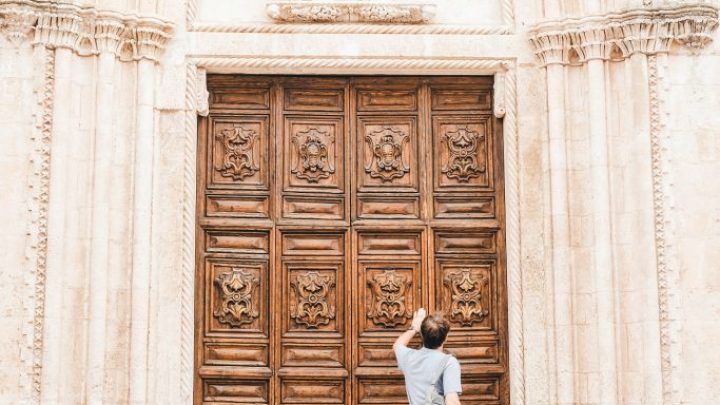The Church of the Misdirected Saints by Paul Jones
I stopped at the entry of the Church of the Misdirected Saints to look at the carved doors. Images of small animals. Pets, I imagined. Comic as cat memes. Ferocious as their wild cousins. A paw batting at a bird. A fanged mouth carrying a lizard. A rabbit without a head in the jaws of a corgi. All of a savage cuteness. The kind that solicits an Oh! Then a rising note of Oooooh! Drop it! I said Drop it! Nothing is dropped. It’s here stalled in motion in dark wood. Inside the doors, the sanctuary is unlit. Darker than the wood, than most nights. But one candle is lit. It asks me in. A fire from my own Misdirected Saint. Oh, Dohn! (I forgive you for your respelling of your own name). You never killed anything. Never killed anyone but yourself — slowly with the three sins against your body — cigarettes, liquor, and weed. The Stations of Your Misdirected Passion are along the walls: Your first visit with Tibetans in New Jersey. The time you tended sick pilgrims at Bodh Gaya. Until one had to tend to you. Your exile in South Carolina where you lived without electricity. Your first trip to Japan to teach American English to older dentists. The confrontation on the train there. When you were called, in Japanese, “a smelly barbarian.” You answered in pitch-perfect local language “It is your heart that will be my next meal.” Staying in Japan. The waterfall temple that would also cleanse you. Your marriage. Bell’s palsy. Your child. All about love. But complicated. The last tape you sent saying “I can’t and won’t write. Listen to this.” It is that tape playing in The Church like a hymn. The coughs. The wheeze. Something about sumo wrestlers. The silence. And the return to hesitant speech. “I think I am finally On the Road. Call me Sal. I may have found Paradise.”
Paul Jones: In anthologies including Best American Erotic Poems (1800 – Present). Chapbook: What the Welsh and Chinese Have in Common. A manuscript of his poems crashed on the moon’s surface on April 11, 2019.
Photo by Cristina Gottardi
